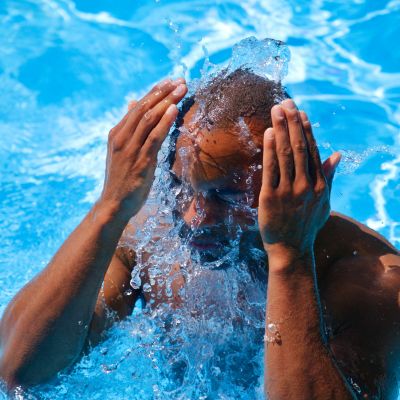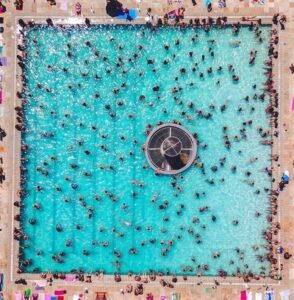Taking a dip is one of the best parts of summer. Unfortunately, this is never a good idea if you wear contacts. Bacteria can use your contacts to infect your eyes and possibly cause long-term harm to your vision. In this blog, we look at how contact lenses and swimming don’t mix, along with how you can protect yourself this summer.
Bacteria can use contact lenses to get into your system regardless of what type of water you’re in. Chemicals from swimming pools and hot tubs also provide their own dangers. Daily contact lenses are your best lens option since you can throw them away after swimming. The best way to protect your eyes while swimming is to take your lenses out beforehand.
Contact Lenses and Swimming
During the summer months in East Tennessee, you will find many of us cooling off in pools, lakes, and rivers. For contact lens wearers, wearing your contact lenses may seem like the best choice to see clearly in the water. However, if you wear contact lenses while swimming, you should know that fresh water, salt water, tap water, and even pools and hot tubs can cause serious eye problems.
Regarding lakes and rivers, contact lenses can absorb bacterial microorganisms in the water. Exposing your eyes to these bacteria can lead to an eye infection when you wear contacts while swimming. Plus, the small pocket underneath a contact lens is a ripe environment for colonies of microorganisms to rapidly grow, which increases your chances of infection.
Regarding swimming pools, you may associate chlorine with eye irritation, but the real problem is that when chlorine mixes with:
- Sweat
- Dirt
- Urine
A chemical called chloramine forms when this happens, making it more dangerous to swim with contact lenses in. Contacts are absorbent and breathable. This is true whether they’re soft contact lenses such as daily disposable contact lenses or of the rigid gas permeable (RGP) variety. They absorb chemicals like chloramine, which can cause eye irritation and serious eye infections. An eye infection from pool, lake, or river water can progress into a corneal ulcer, which is a severe condition that may result in vision loss.
Another risk of wearing contacts when swimming is a condition called acanthamoeba keratitis, which is a parasite that can eat through your cornea and cause permanent vision loss. To protect your vision, avoid wearing contact lenses while swimming.
To learn how to protect your vision year-round with prescription sunglasses, click here!
Daily Contact Lenses in Knoxville, TN
Contact lenses and swimming are never a good combination. However, that doesn’t mean you can’t choose a better pair of contact lenses for daily use. Gas-permeable contact lenses have come a long way over the years, but constant reuse still opens you up to the risk of irritation and eye infections. This can make them a somewhat riskier option when it comes to your eye health.
That’s where daily disposable contact lenses come in. Unlike gas-permeable varieties, you open a fresh pair of daily lenses in the morning, put them in, and take them out at night. You then start the process anew the next morning. This ensures that you have a clean pair of lenses every day, protecting your eyes from bacteria that can gather on reusable lenses.
While you shouldn’t wear them in the water either, daily contact lenses can help reduce your risk of infection if they get wet. Daily contact lenses are ideal for seasonal allergies, especially in Knoxville. By having a new pair every day, you cut down your exposure to pollen and other allergens that can make you feel less than 100%.
This includes common allergy symptoms such as:
- Swollen eyelids
- Red, irritated eyes
- Itchiness
- Runny or teary eyes
- Light sensitivity
Talk to Dr. Travis Thompson or Dr. Catherine Abbott today about daily disposable contact lenses. They’ll help you find the perfect kind to fit your needs and keep your eyes feeling refreshed all year long!
Click here to read our FAQ about daily contacts!
How to Protect Your Eyes from Infection
It’s clear that contact lenses and swimming don’t mix. Here are a few tips to keep your eyes safe from harmful chemicals and bacteria when you’re swimming this summer:
- Remove your contacts before swimming
- Before putting your contacts back in, rinse your eyes after swimming to remove chemicals or bacteria
- If you must wear contacts, wear water-tight swim goggles to protect your eyes and also clean your contacts immediately after swimming
- Ask your eye doctor about prescription goggles
You can significantly reduce the risk of an eye infection by following these tips. We want you to enjoy swimming while also staying safe and protecting your eyes this summer. Our team can also help you find swimming goggles with prescription lenses that fit your lifestyle.
Are you interested in disposable contacts? Contact us today to schedule your appointment!
It’s never a good idea to mix contact lenses and swimming. Whether it’s fresh, sea, or even tap water, bacteria can use your lenses to get into your eye. Daily lenses won’t protect your eyes from bacteria in the water, but they can lower your risk of infection since you can throw them away. Taking contacts out before getting in the water is the best way to protect your eyes.
Hardin Valley Eyecare & Optical has been serving Knoxville since 2009. Located at 10904 Spring Bluff Way, you can schedule an appointment online or give us a call at (865) 888-0892.





